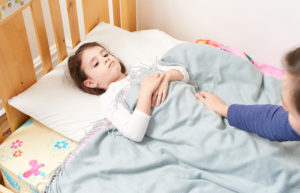 It’s scary when your child is throwing up! If your family falls prey to stomach viruses this year, we all know how horrible it can be. Luckily, it tends to go away in a few days leaving most of us wiped out, but okay. Children are smaller and have less ability to tolerate vomiting and diarrhea compared to adults. Therefore, they get dehydrated much quicker than grownups do.
It’s scary when your child is throwing up! If your family falls prey to stomach viruses this year, we all know how horrible it can be. Luckily, it tends to go away in a few days leaving most of us wiped out, but okay. Children are smaller and have less ability to tolerate vomiting and diarrhea compared to adults. Therefore, they get dehydrated much quicker than grownups do.
Stay Hydrated
If your child is vomiting or having diarrhea, it is of the utmost importance that your child stays hydrated. Food or solids are not important while your child is vomiting. Sometimes vomiting or diarrhea can be a symptom of a more serious illness. If you see any of the following, you should call your doctor quickly…
- Projectile or forceful vomiting
- Blood in the vomit or diarrhea
- Severe stomach pain
- Fevers>104 F
- No improvement in vomiting in 24 hrs
- Persistent diarrhea more than 10 days
- Prolonged diarrhea after finishing antibiotic use.
- Your baby is less than four months old and is having vomiting or diarrhea
- Pain with urination or more frequent urination
- Severe headaches
- Drinking frequently
- Symptoms other than just vomiting or diarrhea
Chances are, however, your child’s troubled tummy will be fine within a few days to a week. All you need to do is make him feel as comfortable as possible and let the illness run its course.
Fluids
For vomiting, give your child small sips of clear fluids that have electrolytes (such as Pedialyte). If your child refuses to drink or is unable to keep fluids down, use a medical syringe and squirt small amounts into his/her mouth every five minutes. Your child needs to urinate at least three times a day. If your child has not urinated for more than eight hours or is lethargic or can’t keep anything down, call your doctor immediately.
Solids
Do not give milk or heavy foods, such as dairy or fried foods. These are likely to come back up. If your child wants to eat, give small amounts of bland foods such as crackers, toast or plain cereal. Foods with lots of liquid are also good – such as popsicles, soup, and jello.
Diarrhea Only
For diarrhea (and no vomiting), give your child the BRAT diet (bananas, rice, applesauce and toast) to help firm up stools. Never give your child any tummy medicine unless your doctor approves it. Lactose can be difficult to digest with diarrhea, so using a lactose-free milk or soy milk/formula temporarily may help with symptoms. Probiotics are also useful for combating diarrhea. Probiotics are the healthy bacteria that help keep our digestive system healthy. If your child is not vomiting, then eating yogurt is one way to get probiotics.
Wash Your Hands Often
Keeping hands clean is one of the most important steps we can take to avoid getting sick and spreading germs to others. Many diseases and conditions are spread by not washing hands with soap and clean, running water. To prevent spreading the virus to others, wash your hands frequently! The viral particles are in the vomit and the stool. Make sure that other children do not share utensils, cups and food with the sick child.
Contact Us (859-525-8181) if you have any questions!
—
 About Pediatrics of Florence
About Pediatrics of Florence
We believe that children are more than just “little adults.” They have unique personalities, challenges, and life circumstances and we have made every effort to make our offices and care as “kid friendly” as possible. We have an aquatic theme in the waiting rooms (separated for sick and well children) as well as themed examination rooms. All of our physicians are Board Certified Pediatricians and members of the American Academy of Pediatrics and our nurse practitioners are all licensed Pediatric Nurse Practitioners and are available to see both well and sick children.
>> Learn More About Pediatrics of Florence
